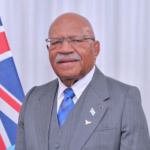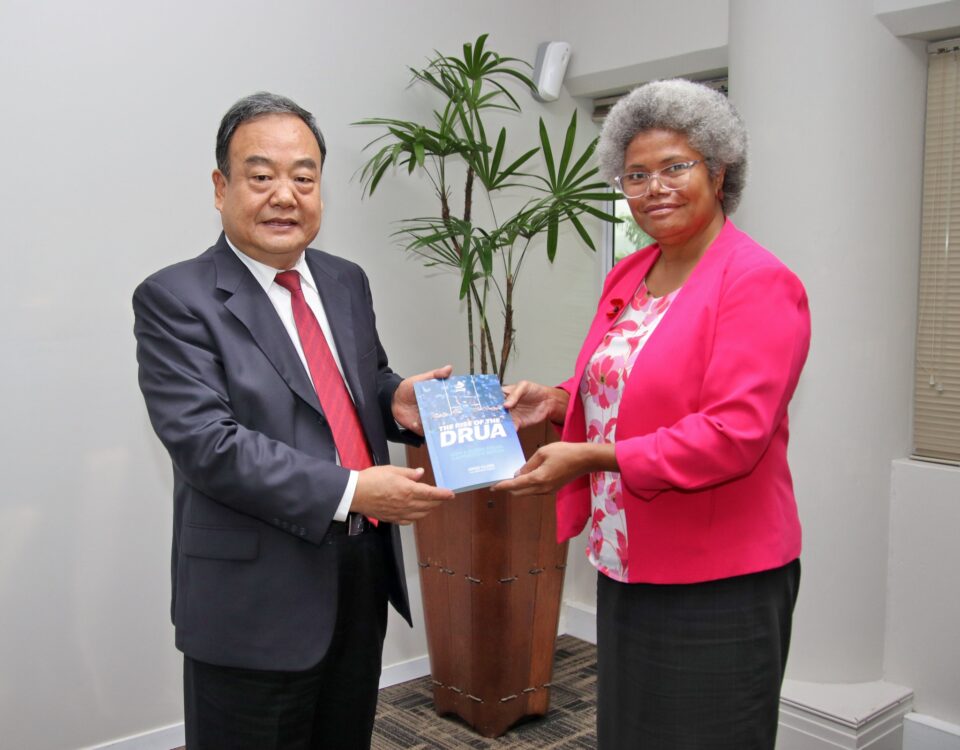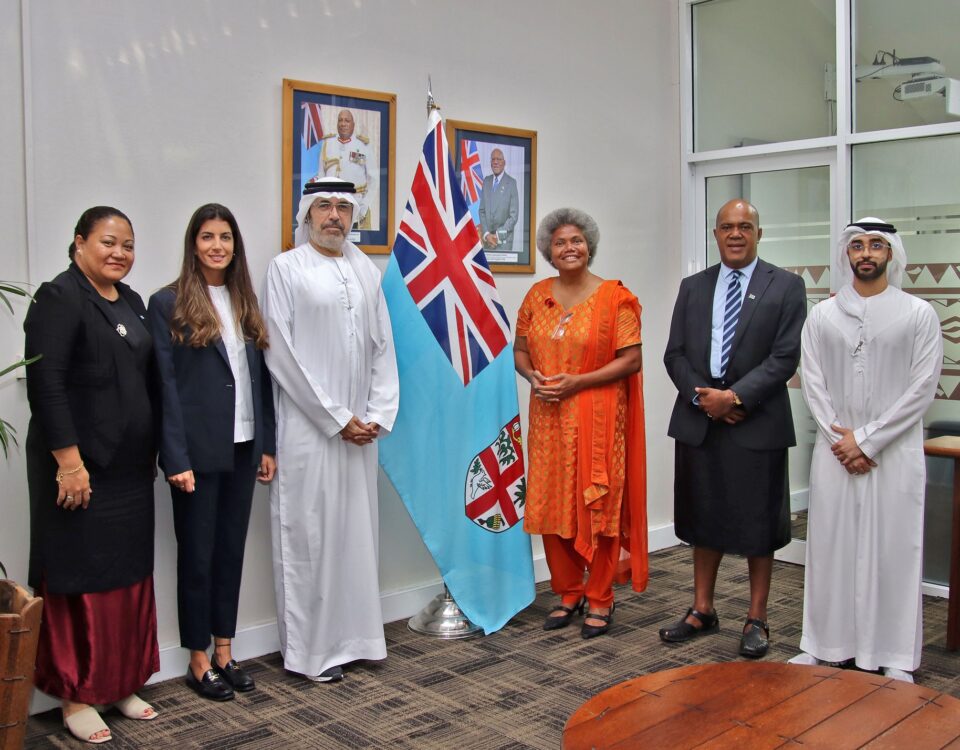
PRIME MINISTER RABUKA CONVEYS CONGRATULATORY MESSAGE TO NEW ZEALAND’S NEW PRIME MINISTER
08/12/2023
FIJI HOSTS PANEL DISCUSSIONS ON ‘COMPREHENSIVE RISK VULNERABILITY’ AT COP28
11/12/2023Published On: 11/12/2023
Fiji’s Ambassador to the United Arab Emirates, His Excellency Naipote Katonitabua, delivered the keynote address at the COP28 on the importance of empowering youth to take action against climate change.
The theme of the event was “Empowering Youth Climate Leadership: Experiences from the Commonwealth in Access to Climate Finance, Capacity Building, and Technology”.
Speaking to a global audience, Ambassador Katonitabua drew attention to Fiji’s susceptibility to climate change and commended the proactive role played by Fijian youth in addressing environmental issues.
He shared that over 60 percent of Fiji’s population is below the age of 35, highlighting the youthful demographic that is actively leading initiatives against climate change.
“Fijian youths are on the frontline, engaged in impactful activities such as mangrove planting, plastic waste collection transformed into art, and coral rehabilitation in the face of rising sea temperatures and cyclones,” he said.
The Ambassador emphasised two key initiatives – the Fiji Youth Climate Action Network and the Youth Empowerment and Sustainable Development Program.
The former, a youth-led organisation, conducts workshops, awareness campaigns, and projects to educate and engage young Fijians in climate change issues.
The latter trains young individuals to become climate change ambassadors, advocating for sustainable practices and implementing environmental projects in their communities.
Highlighting the significance of the Fiji Climate Change Act 2021, Ambassador Katonitabua said it focuses on youth and marginalised communities.
“This legislative framework guides the development of long-term climate change measures, aiming to protect people, ecosystems, and biodiversity in the face of a climate emergency,” he explained. The Ambassador called for increased commitment from multilateral and bilateral partners to empower youth in climate action projects.
Expressing gratitude to the Commonwealth Secretariat for organising the side event, Ambassador Katonitabua acknowledged the organisation’s support for Fiji through technical assistance, including feasibility studies, and the deployment of a full-time climate finance advisor within the Climate Change Division.
“The Sharm Al Sheikh Implementation Plan recognised youth engagement as the most important component for responding to climate change, not just at the grassroots level, but across all levels and all areas of engagement, from policy development to project implementation. This call for the inclusion of young people and their experience and expertise is one that the Commonwealth strongly supports and advocates,” Ambassador Katonitabua added.
He stressed the importance of international cooperation in achieving sustainable solutions and reiterated the urgency of responding to the demands and voices of young people for swift climate action. The high-level side event was organised by the Commonwealth Secretariat in collaboration with the Governments of Fiji and Zambia and is based on the engagement of the Secretariat in these countries around youth engagement for climate action.
A joint report titled ‘The Availability of Climate Finance Funds for Youth’ was also launched at the event. The report maps out the availability of climate finance for youth-led action and reviews a sample of 100 climate finance initiatives related to youth through publicly available reports through website content and newsletters. Through Commonwealth initiatives and networks like the Commonwealth Climate Finance Access Hub and the Commonwealth Sustainable Energy Transition Youth Action Group and our Commonwealth Youth Network, the Commonwealth has been able to support projects and initiatives supporting young people across all our networks. The Hon. Eng. Collins Nzovu, MP, Minister of Green Economy and Environment for the Republic of Zambia also spoke at the event, along with Dr Ruth Kattumuri, Senior Director of Economic, Youth and Sustainable Development Directorate (EYSD) at the Commonwealth Secretariat.
Permanent Secretary in the Office of the Prime Minister, Republic of Fiji Mr. Pita Wise was also present at the event.
Speaking to a global audience, Ambassador Katonitabua drew attention to Fiji’s susceptibility to climate change and commended the proactive role played by Fijian youth in addressing environmental issues.
He shared that over 60 percent of Fiji’s population is below the age of 35, highlighting the youthful demographic that is actively leading initiatives against climate change.
“Fijian youths are on the frontline, engaged in impactful activities such as mangrove planting, plastic waste collection transformed into art, and coral rehabilitation in the face of rising sea temperatures and cyclones,” he said.
The Ambassador emphasised two key initiatives – the Fiji Youth Climate Action Network and the Youth Empowerment and Sustainable Development Program.
The former, a youth-led organisation, conducts workshops, awareness campaigns, and projects to educate and engage young Fijians in climate change issues.
The latter trains young individuals to become climate change ambassadors, advocating for sustainable practices and implementing environmental projects in their communities.
Highlighting the significance of the Fiji Climate Change Act 2021, Ambassador Katonitabua said it focuses on youth and marginalised communities.
“This legislative framework guides the development of long-term climate change measures, aiming to protect people, ecosystems, and biodiversity in the face of a climate emergency,” he explained. The Ambassador called for increased commitment from multilateral and bilateral partners to empower youth in climate action projects.
Expressing gratitude to the Commonwealth Secretariat for organising the side event, Ambassador Katonitabua acknowledged the organisation’s support for Fiji through technical assistance, including feasibility studies, and the deployment of a full-time climate finance advisor within the Climate Change Division.
“The Sharm Al Sheikh Implementation Plan recognised youth engagement as the most important component for responding to climate change, not just at the grassroots level, but across all levels and all areas of engagement, from policy development to project implementation. This call for the inclusion of young people and their experience and expertise is one that the Commonwealth strongly supports and advocates,” Ambassador Katonitabua added.
He stressed the importance of international cooperation in achieving sustainable solutions and reiterated the urgency of responding to the demands and voices of young people for swift climate action. The high-level side event was organised by the Commonwealth Secretariat in collaboration with the Governments of Fiji and Zambia and is based on the engagement of the Secretariat in these countries around youth engagement for climate action.
A joint report titled ‘The Availability of Climate Finance Funds for Youth’ was also launched at the event. The report maps out the availability of climate finance for youth-led action and reviews a sample of 100 climate finance initiatives related to youth through publicly available reports through website content and newsletters. Through Commonwealth initiatives and networks like the Commonwealth Climate Finance Access Hub and the Commonwealth Sustainable Energy Transition Youth Action Group and our Commonwealth Youth Network, the Commonwealth has been able to support projects and initiatives supporting young people across all our networks. The Hon. Eng. Collins Nzovu, MP, Minister of Green Economy and Environment for the Republic of Zambia also spoke at the event, along with Dr Ruth Kattumuri, Senior Director of Economic, Youth and Sustainable Development Directorate (EYSD) at the Commonwealth Secretariat.
Permanent Secretary in the Office of the Prime Minister, Republic of Fiji Mr. Pita Wise was also present at the event.





